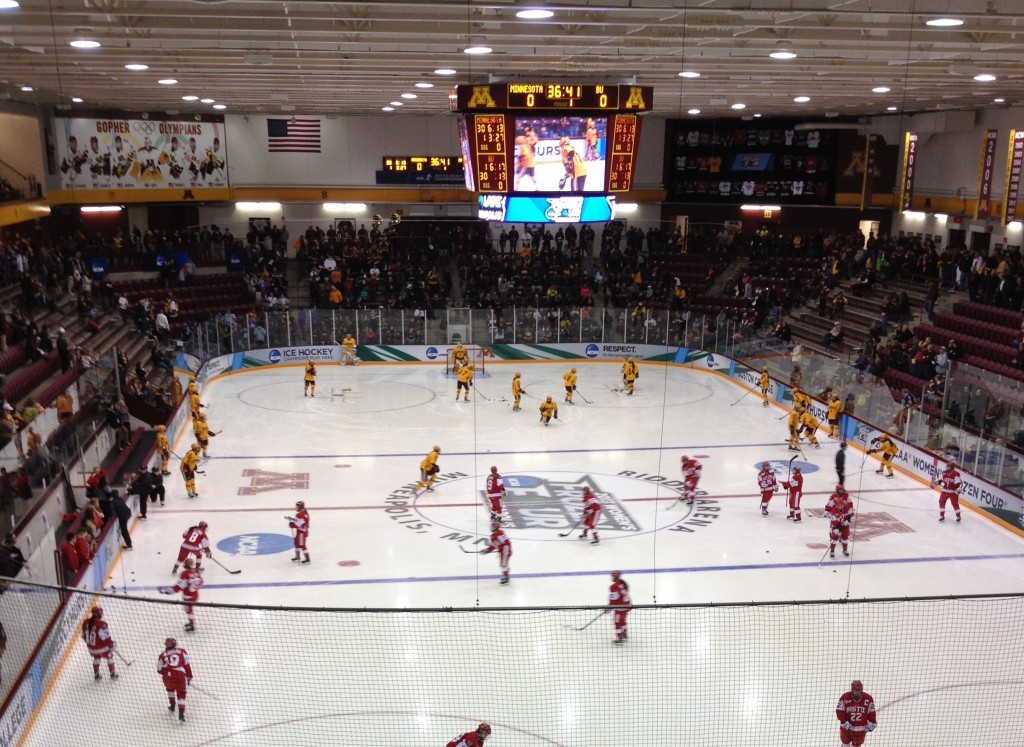In mid-December 2012, I was in a bind. As the women’s hockey columnist for New England Hockey Journal, I had to find a lead for my holiday break column that didn’t involve me interviewing a student-athlete.
Somehow – I’m not exactly sure where – I came across the story of a former Northeastern player who had just opened a coffee shop in New York City. I emailed for an interview, and she called me from her store within minutes. It was a great chat, making the story an absolute pleasure to write.
Embed from Getty Images Fast forward five years. That player was Dani Rylan, now commissioner of the National Women’s Hockey League (NWHL), the first women’s hockey league to pay players. As of last week, the four team league has two agreements in place with NHL teams, and even has a corporate coffee sponsor in Dunkin’ Donuts. (I am sensing a caffeinated theme here…) The NWHL has had its stumbles, and I don’t necessarily agree with everything it has done, but I can’t deny that it has had a lasting impact on women’s hockey.
New England Hockey Journal has since purged its online archives, but I still have the version of the story on Rylan I sent to my editor on December 19, 2012. Enjoy!
———————
It’s 6:15pm, and former Northeastern University women’s hockey player Dani Rylan has been at work for just about fourteen hours. But she sounds as enthusiastic as ever.
“I’ve been here since 4:30am,” she explains, the till of a reconciling cash register ringing in the background. “And I have a hockey game at 8:30pm tonight. It’ll be my first hockey game since opening the shop. I don’t think my teammates will like my backcheck tonight.”
“The shop” Rylan speaks of is Rise and Grind, a coffee shop she opened December 17th in East Harlem, New York. The former forward for the Huskies found herself in the coffee business unexpectedly just months after graduating from Northeastern. The former GoNU.com reporter had one of her dream opportunities working for NHL Network placed on hold because of the pesky lockout, and found herself looking for work.
“I had moved to New York City to work for the NHL Network. My brother lives in New York City too, working as a coffee distributor. He had a storefront he wasn’t using, so we worked out a business deal. I got the storefront and a coffee distributor and opened up a shop.”
But unlike her hockey playing days, running coffee shop ownership is not exactly a team effort. “I am a one man band,” Rylan laughed. “I can’t afford to hire anyone else until I pay off my business loans, so it’s just me.”
Rylan isn’t just running the shop solo – she renovated the 200 square foot, eight foot space by herself as well. “My friend designed the shop, but I had to do all of the renovation work. I ended up laying tile and all of that.
“I compared (the renovations) to preseason. I was pulling twenty hour days to to get the shop ready. It was just like working incredibly hard in the preseason with the hope that it pays off during the season. I feel the same way about this.”
It may seem like Rylan is up against incredible odds, but odds have never stopped her before. Rylan played undergraduate hockey on the men’s ACHA club team at Metro State in Colorado after playing high school hockey with Assabet Valley and and ISL’s St. Mark’s. When it was time for graduate school, she found herself in the sports leadership program at Northeastern, which allowed her two years to play for the Huskies. Despite the brief length of her tenure, she made an impact. She tallied six goals and 14 assists in 70 games played for the Huskies. Rylan was named a tri-captain for 2011-12 and had assists on game-winners in some of the biggest games of the year, including Northeastern’s Beanpot championship.
“The Beanpot championship allowed us to be rockstars on campus for a little bit,” recalls Rylan. “We were wearing our 2012 Beanpot championship gear around campus for a few weeks.”
One of those pieces of Beanpot memorabilia has made it into Rise and Grind.
“I donate five cents of each cup of coffee I sell to Ice Hockey in Harlem,” explained Rylan. “I physically put the five cents in a stainless steel style mug we all got that says 2012 Beanpot champions on it. I keep it next to the register. It’s not a lot of money, but I hope it makes a difference.”
Even though she finds herself practically living at the shop, Rylan finds the time to keep up with this season’s Northeastern squad. “I talk to a lot of them still, and I keep up on GoNU. I just loved being on the team. I think they all got sick of my telling them how much I loved them all when I was captain.”
Rylan considers this week her shop’s soft opening “to get the kinks out,” but will have her grand opening on January 2nd. It was not exactly what she had in mind when she thought of life after college hockey, but it is turning out to be something that excites her as much as hockey – and that’s not her coffee talking.
“My brother came by this afternoon when no one was in the shop and he caught me dancing behind the counter,” she laughed. “I told him I’m having fun! I wouldn’t be having as much fun if I were working for someone else’s coffee shop. It’s a lot more fun when you are doing things for yourself.”
